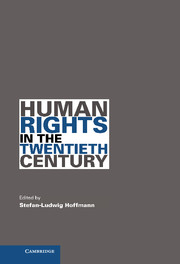Book contents
- Frontmatter
- Contents
- Notes on Contributors
- Acknowledgments
- Introduction: Genealogies of Human Rights
- Part I The Emergence of Human Rights Regimes
- 1 The End of Civilization and the Rise of Human Rights
- 2 The “Human Rights Revolution” at Work
- 3 ‘Legal Diplomacy’ – Law, Politics and the Genesis of Postwar European Human Rights
- Part II Postwar Universalism and Legal Theory
- Part III Human Rights, State Socialism, and Dissent
- Part IV Genocide, Humanitarianism, and the Limits of Law
- Part V Human Rights, Sovereignty, and the Global Condition
- Index
- References
1 - The End of Civilization and the Rise of Human Rights
The Mid-Twentieth-Century Disjuncture
Published online by Cambridge University Press: 05 June 2012
- Frontmatter
- Contents
- Notes on Contributors
- Acknowledgments
- Introduction: Genealogies of Human Rights
- Part I The Emergence of Human Rights Regimes
- 1 The End of Civilization and the Rise of Human Rights
- 2 The “Human Rights Revolution” at Work
- 3 ‘Legal Diplomacy’ – Law, Politics and the Genesis of Postwar European Human Rights
- Part II Postwar Universalism and Legal Theory
- Part III Human Rights, State Socialism, and Dissent
- Part IV Genocide, Humanitarianism, and the Limits of Law
- Part V Human Rights, Sovereignty, and the Global Condition
- Index
- References
Summary
The recent upsurge of interest in the history of human rights must surely be seen as one of the more productive intellectual consequences of the ending of the Cold War. The early 1990s spawned hopes for the emergence of a new world order in which the United Nations would be able to regain some of the lustre it had lost while sidelined over the preceding decades, and the sense of the start of a new historical epoch directed scholarly attention back toward the start of the previous one, in 1945. The increasingly grim spiral of events thereafter if anything confirmed the importance of historicizing the human rights phenomenon: The war in the former Yugoslavia and genocide in Rwanda put in question the robustness of the human rights regime that had been established after the Second World War, while the advent of a unilateralist American administration with a thinly veiled contempt for the UN has inspired several American historians to write accounts of the internationalism of earlier administrations in an effort to remind people of the alternatives.
The year 1945 was not a Year Zero for internationalists: The roots of the UN were much more firmly embedded in the past than its founders felt it was expedient to admit. Nevertheless, in at least one crucial respect, 1945 did represent a break with the past. It is commonplace to regard that year as the ‘end of the European era’, meaning the end of an era in which the European Powers effectively dominated world politics; but this collapse of European power carried with it something rather less discussed – the parallel erosion of Europe’s normative dominance of international affairs. Between 1815 and the war, a system of states had grown up that was based on the primacy of European power and values, and the rationalization of their imperial expansion in terms of the spreading of civilization and its accompanying rights. The First World War had dented confidence in the idea of Civilization (with a capital C), but it was, above all, the rise of Nazism that spelled its doom. The rise of a new order after 1945 was based on new, or at least, substantially adapted principles, and, for perhaps the first time, the question of rights was detached from the notion of civilization. This essay explores the rise and fall of the concept of civilization as an ordering principle for international politics, a concept bound up with the idea of freedom, humanity and rights, and one whose demise could not but affect the projection and political significance of those values as well.
- Type
- Chapter
- Information
- Human Rights in the Twentieth Century , pp. 29 - 44Publisher: Cambridge University PressPrint publication year: 2010
References
- 3
- Cited by



